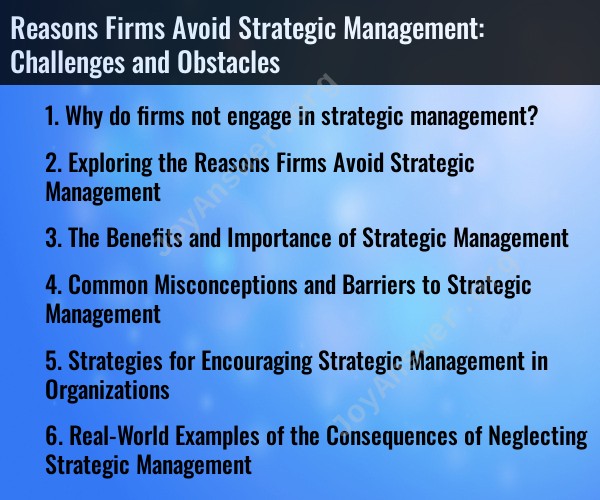Why do firms not engage in strategic management?
Firms may choose to avoid or neglect strategic management for various reasons, even though it is considered a fundamental process for achieving long-term success and sustainability. The decision to do so is often influenced by several challenges and obstacles, which can include:
Lack of Awareness or Understanding: Some firms may not fully grasp the importance of strategic management or may not understand how to go about it. They may perceive it as a complex, time-consuming process and opt for short-term, reactive decision-making instead.
Resource Constraints: Developing and implementing a strategic management plan often requires financial and human resources. Smaller or resource-constrained firms might struggle to allocate the necessary resources, believing that they cannot afford the time and investment required.
Overemphasis on Short-Term Results: In a highly competitive business environment, firms may prioritize short-term financial gains over long-term strategic planning. Quarterly earnings and immediate financial results can dominate decision-making at the expense of long-term sustainability.
Resistance to Change: Implementing a strategic plan often necessitates changes in the organization's structure, culture, and operations. Resistance to change from employees and management can hinder the strategic management process.
Complexity and Uncertainty: Strategic management involves dealing with complex and uncertain environments. Some firms may shy away from this complexity and instead opt for reactive, incremental approaches to decision-making.
Lack of Leadership Commitment: Without strong leadership commitment to strategic management, it is unlikely to succeed. In some cases, leaders may be hesitant or unwilling to embrace strategic thinking and planning.
Industry-Specific Factors: The competitive dynamics of a specific industry can affect a firm's willingness to engage in strategic management. In mature or stagnant industries, firms might become complacent and neglect strategic planning.
Operational Overload: Some firms, especially small businesses, may be overwhelmed by the daily demands of running their operations. This can leave little time or energy for strategic thinking and planning.
Crisis Management: In times of crisis or financial distress, firms may prioritize immediate problem-solving and survival over long-term planning. This is a natural response to address urgent challenges, but it can lead to a lack of strategic focus.
Previous Failures: If a firm has experienced failures in past attempts at strategic management, they may be reluctant to try again. This can result in a negative perception of strategic planning within the organization.
It's important to note that while these obstacles and challenges can deter firms from engaging in strategic management, many successful organizations recognize the importance of strategic planning and overcome these barriers to ensure long-term success. Effective strategic management is a key driver of sustained competitiveness and adaptability in today's rapidly changing business environment.
Exploring the Reasons Firms Avoid Strategic Management
There are a variety of reasons why firms avoid strategic management. Some of the most common reasons include:
- Lack of time and resources: Strategic management can be a time-consuming and resource-intensive process. Many firms, especially small businesses, simply do not have the resources to devote to strategic planning.
- Fear of change: Strategic management often requires making significant changes to the way a firm operates. This can be a daunting task, and many firms are reluctant to embrace change.
- Lack of understanding: Some firms simply do not understand the benefits of strategic management and how to implement it effectively.
- Short-term focus: Many firms are focused on short-term profits and results. Strategic management, on the other hand, is a long-term process. Firms that are focused on the short term may be less likely to invest in strategic planning.
- Complacency: Firms that are successful in the present may be less likely to see the need for strategic planning. However, even successful firms need to constantly adapt and evolve in order to stay ahead of the competition.
The Benefits and Importance of Strategic Management
Strategic management is the process of developing and implementing strategies that help a firm achieve its goals and objectives. It is an important process for all firms, regardless of size or industry.
The benefits of strategic management include:
- Improved performance: Firms that engage in strategic management tend to perform better financially than firms that do not.
- Increased competitiveness: Strategic management can help firms to develop and maintain a competitive advantage in the marketplace.
- Improved decision-making: Strategic management provides a framework for making better decisions about the future of the firm.
- Enhanced focus and direction: Strategic management helps firms to focus on what is important and to stay on track to achieve their goals.
- Improved communication and alignment: Strategic management can help to improve communication and alignment between different departments and levels of the firm.
Common Misconceptions and Barriers to Strategic Management
There are a number of common misconceptions and barriers to strategic management. Some of the most common include:
- Strategic management is only for large firms: Strategic management is just as important for small businesses as it is for large firms.
- Strategic management is too expensive: Strategic management does not have to be expensive. There are a number of low-cost and no-cost resources available to help firms develop and implement strategies.
- Strategic management is only for public companies: Strategic management is important for all firms, regardless of ownership structure.
- Strategic management is a one-time event: Strategic management is an ongoing process that should be reviewed and updated regularly.
- Strategic management is too complex: Strategic management can be complex, but there are a number of resources and tools available to help firms implement it effectively.
Strategies for Encouraging Strategic Management in Organizations
There are a number of strategies that can be used to encourage strategic management in organizations. Some of these strategies include:
- Provide training and resources: Firms should provide their employees with the training and resources they need to develop and implement strategies.
- Create a culture of strategic thinking: Firms should create a culture that encourages employees to think strategically about the future of the firm.
- Link strategic planning to rewards and recognition: Firms should link strategic planning to rewards and recognition programs in order to motivate employees to engage in this process.
- Make strategic planning a regular part of the business cycle: Firms should make strategic planning a regular part of the business cycle and should review and update their strategies on a regular basis.
- Involve employees in the strategic planning process: Firms should involve employees from all levels of the organization in the strategic planning process. This will help to ensure that the strategies developed are realistic, achievable, and supported by the entire organization.
Real-World Examples of the Consequences of Neglecting Strategic Management
There are a number of real-world examples of the consequences of neglecting strategic management. For example, the following companies have all experienced financial difficulties or other challenges due to a lack of strategic planning:
- Kodak: Kodak failed to adapt to the rise of digital photography and eventually filed for bankruptcy.
- Blockbuster: Blockbuster failed to adapt to the rise of streaming video and eventually filed for bankruptcy.
- Nokia: Nokia failed to adapt to the rise of smartphones and lost its market share to Apple and Samsung.
- Sears: Sears failed to adapt to the changing retail landscape and eventually filed for bankruptcy.
These are just a few examples of the consequences of neglecting strategic management. It is important for all firms to engage in strategic management in order to stay ahead of the competition and to achieve their goals












